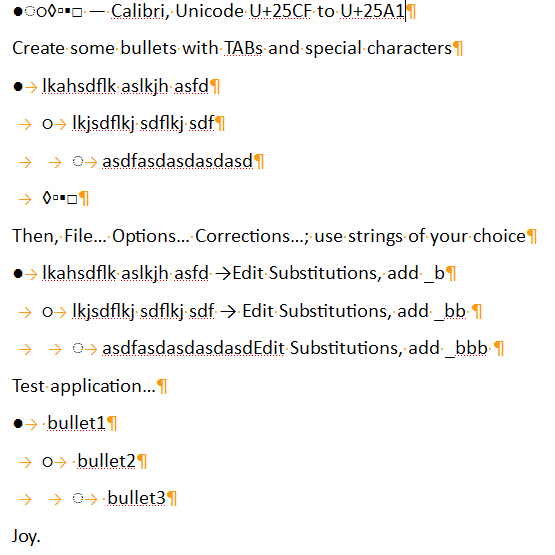[omitted yet more tedious, unsuccessful experiments with bullets, style definitions w/ and w/o “save all formatting”, etc.; para/character styles]
Hope this might relieve some stresses for other outliners like me…
I came up with a hack that works for me; no doubt someone has done the same before, but it didn’t turn up when I tried searching the forum for workarounds.
So, finally: use the character map to identify suitable bullets, create lead-in of [bullet,tab],[bullet,tab],[bullet,tab] sequences, then create “additional substitutions”.
It’s clunky but it ensures bullet alignment respects the style margins, and allows lists to be easily moved around. AND you can edit/replace bullets.
UPDATE if your points wrap to new lines, then define styles appropriately; even clunkier but copy/paste paras thereafter.
Illustrations (formatted as code to preserve tabs)
Load your bullets: e.g. ●◌○◊:white_small_square:![]() □ — Calibri, Unicode U+25CF to U+25A1 (haha, “:small white square:” is inserted on posting). Create some bullets with TABs and special characters.
□ — Calibri, Unicode U+25CF to U+25A1 (haha, “:small white square:” is inserted on posting). Create some bullets with TABs and special characters.
● lkahsdflk aslkjh asfd
○ lkjsdflkj sdflkj sdf
◌ asdfasdasdasdasd
◊▫▪□
Then, File… Options… Corrections…; use strings of your choice for the [bullet, tab] sequences copied from above into the replacement box.
● lkahsdflk aslkjh asfd →Edit Substitutions, add _b
○ lkjsdflkj sdflkj sdf → Edit Substitutions, add _bb
◌ asdfasdasdasdasdEdit Substitutions, add _bbb
Test application…
● bullet1
○ bullet2
◌ bullet3
![]() Joy.
Joy.![]()
If I need to change tab stops, margins, (re)define styles etc. I can, and everything should work transparently without conflicts between Scrivener and the underlying text engine.
and again as an image to show the tabs etc.
